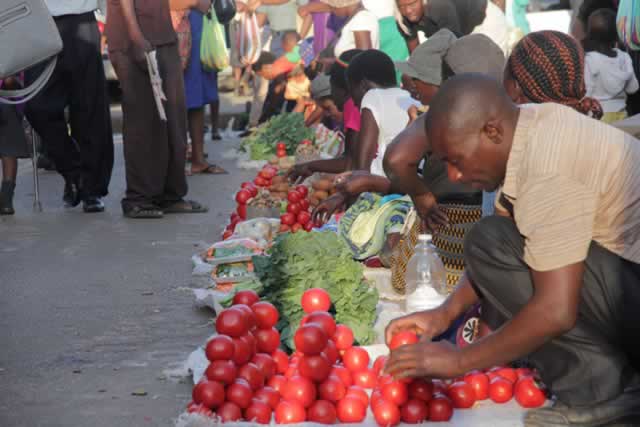Vendors: Everyone’s problem, perhaps

Over the past few months Harare and most other cities have had an upsurge in informal trading, chief of which is vending and hawking.
Vending is not something new in Harare and elsewhere.
And there is no reason even to politicise the issue.
It is a source of livelihood for many households in the developing world.
Go to the capitals and metros of West Africa, East Africa, Asia and South America and Harare pales into insignificance with its couple of thousand-odd vendors and hawkers.
An important fact is that in these countries where the informal economy is sizeable, street vending is a source of livelihood.
Here is what the Women In Informal Employment say about the capacity of street trade:
“Street trade accounts for a significant proportion of informal non-agricultural employment in Africa. Street vendors make up 13 percent in Dakar, Senegal; 19 percent in Cotonou, Benin; and 24 percent in Lomé, Togo.
“In some Asian and Latin American cities, street vendors form a large portion of the urban workforce: Hanoi and Ho Chi Minh City, Viet Nam: 11 percent Lima, Peru: 9 percent”
The organisation reveals that national level statistics say street vendors account for 11 percent of total urban employment in India and 15 percent in South Africa.
(And only two years ago, authorities in Johannesburg removed an estimated 5 000 to 6 000 traders under an operation codenamed “Clean Sweep” (sounds familiar?) which was only halted by the Constitutional Court which ruled in favour of the continuation of informal trade.)
Now those are quite some figures.
Some of us have actually seen these places while others have only watched on television.
But the picture stays the same.
Where Harare has gone is not uncharted territory.
The sun that set
Perhaps the greatest gripe that many people have, apart from the inconveniences caused by the vendors who sell their wares on the pavements, is that we are watching helplessly as the sun is setting on the good old Sunshine City.
It was a city of cleanliness – and the vendors are dirty – and it was a city that you could walk freely without hindrance or obstruction on the pavements.
It also had sacred places such as First Street Mall where only the anointed would tread.
Now that is gone and First Street is no longer so holy what with the street traders, including one or two maize grills, have pervaded the place.
First Street is where blacks were not even allowed to walk in colonial Rhodesia.
It should have remained such a place of apartheid, some of us seem to think.
Only it would have nothing to do with colour.
You should get us clear on at least two points.
First, one cannot condone what is happening in the city at the moment where there is total chaos on some streets that have been rendered impassable.
Secondly, one cannot condone the lull and laxity that has characterised the official response of vending in the city.
The first point relates to the alleged remarks that are attributed to the First Lady Grace Mugabe supposedly to the effect that vendors should not be chased away from the streets.
Now every other Jack and Jill vendor is mouthing these alleged exhortations.
One can be sure that Dr Amai was misquoted and her name being dropped willy-nilly.
Even in the ruling party some unscrupulous people are doing that and even stealing from people.
That’s criminal.
So it goes for those name droppers on the street.
You cannot break the law -and the city has its by-laws – at the drop of the First Lady’s name.
Even if you love her and the party of her husband.
It is not something she would cheer, we are sure.
Connected to this first point is the laxity of the City Fathers to enforce their own laws.
And hold it! You do not have to be heavy-handed on inhumane to enforce the law.
After all, these are just by-laws in a democratic country not some martial law in a banana republic.
There is a bigger failure on the part of the city, which we shall discuss.
Snobs’ sobs
Now we have a serious problem with the current discourse that seeks to belittle vendors as some kind of unwanted species.
By all means, vendors are part of the informal sector that is holding up to US$7 billion that is not in the formal sector, which has a pale US$3 billion circulating.
Now next time, you snob, look down on your nose on these vendors remember that little fact.
And, by the way, there is some hypocrisy, reeking hypocrisy, that you can smell in this snobbery and vendor-bashing.
Vendors are there on the streets, downtown, because there is a market.
The streets they line and pavements pervade are the thoroughfares from the offices.
It is the same office men and women who buy from the vendors.
If we all snubbed vendors on the pavement, they would not be there because all they need is a ready, accessible market.
Which we are.
We are buying anything and everything the vendors bring us from fruits, sweets and airtime to second-hand underwear and socks.
It is a reality and no one should, can, deny.
Stop buying from the vendors and they are gone.
Continue buying from the streets and just shut up!
A new normal
It has to be accepted that Zimbabwe is experiencing a new normal, which has come about due to the economic pressures occasioned by sanctions imposed on Zimbabwe by the West.
Industries have shut down and all other formal economic activities have taken a downturn.
Even people do not bank like they used to do, that is why the vendors and their informal ilk have all the money that we do not have in the formal sector.
Rather than be shocked and disgusted, measures must now be put in place to befriend and accommodate vendors.
It must also be considered that by the same people expressing fake disgust at vendors and other informal traders – many of them doing so on social media, that virtual space they climb from when they need something that the traders have – cannot do without the same vendors and traders.
So, what is to be done?
One does not have to be a town planner to have a few ideas.
The first point to take to heart is that the vendors follow the market.
Now, a quick assessment will reveal that there are certain roads that contain the greatest human and vehicular traffic on peak hours.
These are the streets, and there are quite a few in the CBD, that need to be lined up with neat shades on one or both sides, which may take a small strip of road.
Some avenues, streets and or squares could be completely shut down on certain times and days.
The designated places would be trade-specific to the extent that you cannot have a “bhero” being sold where fruits are sold.
Nor can you have roasted maize at a flea market.
All areas outside the designated trade “freeways” are out of bounds for both traders and buyers.
With certain streets leading to a major bus terminus all but designated, one does not need to complain much about taking a detour away from the market.
After all, it is a price you have to pay for a cleaner and more orderly city with or without sunshine.
Some countries have special “market days”, and we could borrow that as well.
At any rate that may significantly contribute towards tourism, domestically and internationally.








Comments